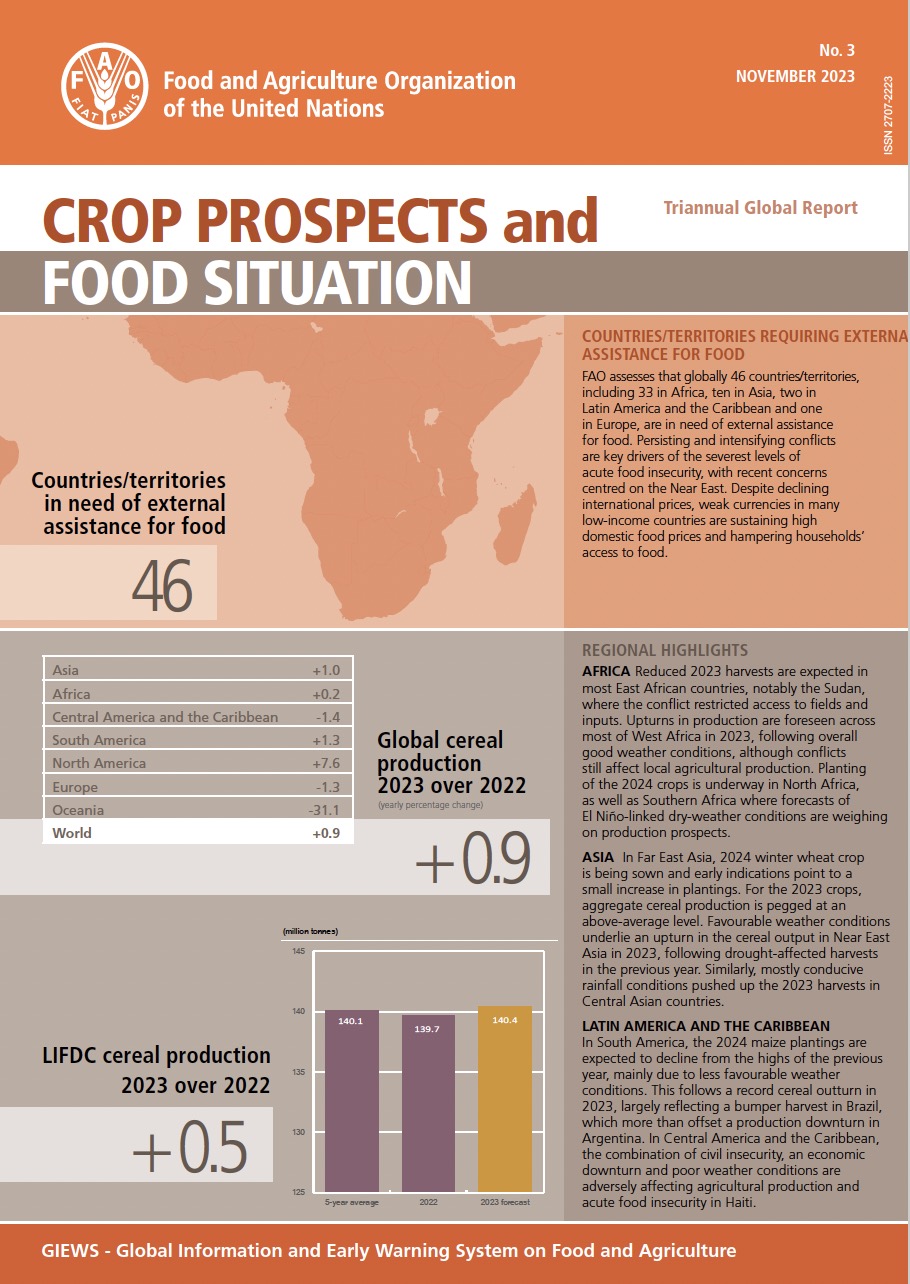FAO's Markets and Trade Division (EST), with its expertise on world agricultural trade, provides analytical and policy information to the United Nations (UN) community, global stakeholders, and beyond. EST keeps a comprehensive market intelligence service of the main agricultural commodities, and houses the Secretariats of the Committee on Commodity Problems (CCP), the Intergovernmental Commodity Groups (IGGs), and the Agricultural Market Information System (AMIS). EST also manages early warnings of food shortfalls.

Global commodity markets
monitors major agricultural commodities, including basic foodstuffs, tropical products and raw materials.

Global Information and Early Warning System (GIEWS)
is the leading source of information on world food production and food security, and it monitors world supply of and demand for basic food.

Trade policy & partnerships
promotes transparent, efficient agricultural commodity markets and trade by supporting its members, including facilitating multistakeholder partnerships.

Emerging trends, challenges and opportunities
produces multidisciplinary analyses related to agricultural trade and markets, and guidance for responsible value chains.
Featured publications
 | The State of Agricultural Commodity MarketsThe State of Agricultural Commodity Markets presents commodity market issues in an objective and accessible way to policy-makers, commodity market observers and stakeholders interested in agricultural commodity market developments and their impacts on countries at different levels of economic development. |
 | Food Outlook - Biannual Report on Global Food MarketsThe Food Outlook is a biannual publication, focusing on developments affecting global food and feed markets. It provides comprehensive assessments and short-term forecasts for production, utilization, trade, stocks and prices on a commodity-by-commodity basis, along with feature articles on topical issues. |
 | OECD-FAO Agricultural Outlook 2025-2034The Agricultural Outlook 2025-2034 is a collaborative effort of the Organisation for Economic Co-operation and Development (OECD) and the Food and Agriculture Organization of the United Nations (FAO). It brings together the commodity,
policy and country expertise of both organisations as well as input from collaborating member countries to provide an annual assessment of the prospects for the coming decade of national, regional and global agricultural commodity
markets.
|
 | Crop Prospects and Food Situation The Crop Prospects and Food Situation (CPFS) report, published three times per year, provides a forward-looking analysis of regional food situations, focusing on cereal production, price trends, and food security conditions, with a particular focus on Low-Income Food-Deficit Countries (LIFDCs). The report includes a global overview of cereal supply and demand conditions, complementing the analysis presented in the biannual FAO Food Outlook publication. The CPFS report is accompanied by the Cereal supply and demand balances for sub-Saharan African countries, released on the same date. |
Latest publications
Special committees
Videos
The Work We Do - Ep1. How to Build Resilient Agrifood Systems, with Máximo Torero, FAO Chief Economist
10/02/2026
In this first episode of The Work We Do, we speak with Máximo Torero, Chief Economist of the Food and Agriculture Organization of the United Nations. Máximo served as the Director of Markets, Trade and Institutions Division at IFPRI and later as an Executive Director for the World Bank representing several South American countries.
World Cotton Day 2025 – Cotton, the Fabric of Our Lives
06/10/2025
Farmed, weaved and brought to us in diverse forms, cotton is the world's most widely used natural fibre.
Online database applications

Commodity policy development tool
Commodity markets

FPMA
Food Price Monitoring and Analysis

AMIS
Agricultural Market Information System

Upcoming events
23/2
2026
Trade Policy Briefs: FAO Support to WTO Negotiations at the 14th Ministerial Conference
Virtual Event, 23/02/2026
In support of the WTO 14th Ministerial Conference (MC14), taking place from 26 to 29 March 2026 in Yaoundé, Cameroon, FAO published a series of Trade Policy Briefs addressing key trade policy questions in the context of WTO negotiations on agriculture.
To present the key...
Latest news

FAO Food Price Index declines in January for fifth consecutive month
06/02/2026
Rome – The measure of world food commodity prices declined in January for the fifth consecutive month, led by lower international quotations for dairy, sugar and meat products, according to the

Related websites
- World Food Situation
- FAO Food Price Index
- FAO Price Data and Analysis
- FAO Responsible Business Conduct (RBC) in Agriculture
- FAO Trade
- FAO Policy Portal
Related links
Contact:












